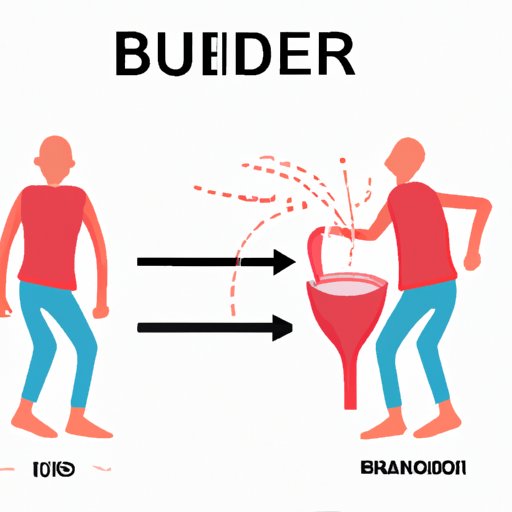Introduction
Have you ever felt the need to visit the restroom immediately after drinking water? This can be an uncomfortable and disruptive problem for many people. Frequent urination after drinking water can be due to a variety of factors, including one’s lifestyle habits, medical conditions, and improper bladder function. In this article, we will explore the science behind this phenomenon and provide solutions to the problem.
The Science Behind Frequent Urination after Drinking Water
When we drink water, it is absorbed into the bloodstream and transported throughout the body. The kidneys filter the blood to remove waste products, and excess water is sent to the bladder for storage. As the bladder fills up, it sends a signal to the brain that it needs to be emptied. This leads to the sensation of needing to urinate.
Drinking water affects urine production and elimination by increasing the volume of urine that the bladder holds. As a result, the bladder fills up more quickly, leading to more frequent urination. However, it is important to note that drinking water has numerous health benefits and does not cause long-term damage to bladder function.
There are also common myths about drinking water and urination, such as the idea that drinking less water will reduce urination. However, limiting water intake can lead to dehydration, which can cause other health problems.
The Causes of Frequent Urination after Drinking Water
Several medical conditions can cause an overactive bladder and contribute to frequent urination. Urinary tract infections and bladder disorders are two examples of conditions that can affect bladder function. Certain medications, such as diuretics, can also increase urine production and contribute to this problem. Stress can also affect bladder function and lead to more frequent urination.
Lifestyle Habits that Affect Urination after Drinking Water
The foods and drinks we consume can also irritate the bladder and lead to more frequent urination. For example, spicy foods, citrus fruits, and carbonated drinks can all cause irritation and inflammation in the bladder. Caffeine and alcohol are diuretics that can also contribute to this problem.
It is important to make dietary and lifestyle changes to improve bladder function, such as avoiding bladder irritants, practicing timed voiding, and doing pelvic floor exercises. These exercises can improve the strength and coordination of the pelvic floor muscles, which are responsible for urinary control.
How to Manage and Control Urination Urges
There are several products and techniques that can help manage incontinence, such as absorbent pads and bladder training. Bladder training involves slowly increasing the time between bathroom visits to train the bladder to hold more urine.
It is also important to address the psychological impact of frequent urination, which can be embarrassing and lead to social isolation. Resources such as support groups and counseling can help individuals cope with this problem.
When to Seek Medical Help for Urinational Issues
Red flags that may indicate a more serious medical condition include blood in the urine, pain during urination, and difficulty urinating. If these symptoms persist or are severe, it is important to seek medical help. A healthcare provider can offer a proper diagnosis and recommend treatments for underlying medical conditions.
Conclusion
Frequent urination after drinking water can be a disruptive and uncomfortable problem. However, it is important to understand the science behind this phenomenon and take steps to manage and control urination urges. By making lifestyle changes, practicing bladder training, and seeking medical help when needed, individuals can improve bladder function and reduce the impact of frequent urination on their daily lives.
If you are experiencing frequent urination after drinking water, don’t hesitate to talk to your healthcare provider or explore additional resources to learn more about bladder health.
